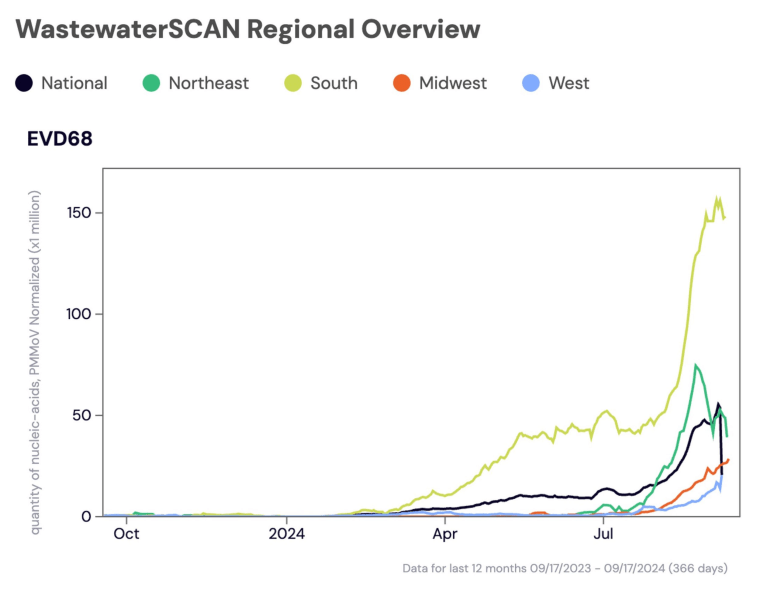Rates of enterovirus D68, a respiratory virus that can sometimes lead to a polio-like illness and paralysis in children, have risen significantly across the U.S. over the past month, new data show.
Nationally, the virus is now being detected at medium levels after having stayed at low levels from September 2023 to August 2024, based on wastewater data from the nonprofit WastewaterSCAN. (Humans infected with viruses may excrete them in waste, so wastewater can detect viral activity in communities.)
Enterovirus D68 activity started rising this past spring in the South, a WastewaterSCAN spokesperson tells TODAY.com. Since then, rates have started rising in all four regions the group tracks (the West, South, Midwest and Northeast) but are still highest in the South.
While the virus usually causes mild, cold-like symptoms and most people have encountered it at some point, the rising rates are concerning because enterovirus D68 can cause a rare but serious complication in kids known as acute flaccid myelitis (AFM), a neurologic condition that comes on suddenly and can cause loss of muscle and reflexes.
And higher rates of enterovirus D68 usually mean higher rates of AFM in, Caitlin Rivers, Ph.D., an epidemiologist at the Johns Hopkins Center for Health Security and author of “Crisis Averted: The Hidden Science of Fighting Outbreaks,” told NBC News.
What’s more, September usually has the highest number of AFM cases, she added.
So far this year, there have been 13 confirmed AFM cases in 10 states, according to CDC data. Since 2014, when AFM was first identified, some 758 people have been diagnosed with the illness.
During the last rise in enterovirus cases in the U.S., in 2022, the CDC urged health professionals to be on the lookout for symptoms of severe enterovirus and AFM in kids. Here’s what to know about the two illnesses.
What to know about enterovirus D68
Enterovirus D68, believed to be pretty common, usually causes respiratory illness, which can range from mild, like a common cold, to more severe, according to the CDC. In many cases, the virus doesn’t cause any symptoms. In the U.S., the risk of infection is greatest in the summer and fall, but it’s possible year-round.
Infants, children and adolescents have the highest risk of getting ill from the virus.
The enterovirus D68 spreads through respiratory secretions, namely saliva and mucus, when an infected person coughs, sneezes or touches a surface that another person then touches.
There are no specific treatments for enterovirus D68. To prevent contracting the virus, practice good hand hygiene, avoid touching your face with unwashed hands, avoid close contact with others when sick, cover your coughs and sneezes and disinfect high-touch surfaces, like door knobs and toys.
Where is enterovirus D68 spreading in the U.S.?
The highest rates of enterovirus in the US are currently in the South followed by the Northeast, according WastewaterSCAN data.
That being said, rates are rising nationwide.

What are the symptoms of enterovirus?
Mild symptoms of enterovirus D68 include runny nose, sneezing, cough, nasal congestion, body aches and muscle aches. Severe symptoms often include wheezing and difficulty breathing, especially shortness of breath or rapid or shallow breathing.
If your child develops any limb or muscle weakness following a respiratory illness, seek medical attention immediately as it could be a sign of AFM.
What to know about AFM
“AFM is an uncommon but serious neurologic condition,” according to the CDC. “Sudden onset of arm or leg weakness, loss of muscle tone, and loss of reflexes are the most common symptoms.”
AFM is most common between August and November, when enteroviruses are also most common. More than 90% of AFM cases are in young children.
When AFM was first identified in 2014, it was a “mystery illness.” Since then, the CDC has recorded two more spikes of AFM in 2016 and 2018. All which are believed to be caused by enterovirus D68.
The 2022 wave of enterovirus D68 didn’t lead to a rise in AFM cases, though. Experts are still trying to understand why.
Where has AFM been detected in the U.S.?
So far in 2024, there have been 13 AFM cases in 10 states, per CDC data:
- California
- Florida
- Illinois
- Iowa
- Louisiana
- New Mexico
- New York
- Oregon
- Pennsylvania
- Texas
What are the symptoms of AFM?
Seek medical attention right away if your child develops any of the following symptoms, especially after a respiratory illness, as patients with AFM should be hospitalized right away:
- Sudden arm or leg weakness
- Sudden loss of muscle tone or reflexes
- Difficulty moving or dropping eyelids
- Facial drooping or weakness
- Difficulty swallowing or slurred speech
- Pain in arms, legs, neck or back
- Numbness or tingling in arms or legs
It takes between one and four weeks for a case of enterovirus D68 to progress to AFM; usually the patient has recovered from their respiratory symptoms before neurologic symptoms begin, according to NBC News.
“The outcomes are everything from just a little bit of slight shoulder weakness to difficulty moving all extremities and sometimes even needing prolonged respiratory support,” Dr. Sarah Hopkins, a pediatric neurologist at Children’s Hospital of Philadelphia, told NBC News in 2022.
The neurologic symptoms usually appear suddenly and can progress quickly, often peaking in just a few hours. There is no specific treatment, so the best way to protect your family is to practice good hand hygiene and wear a mask in public.
Read the full article here
















